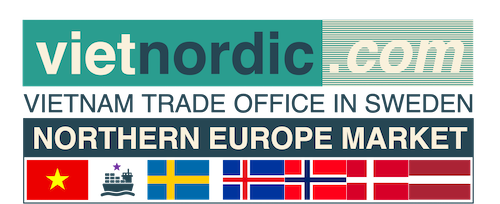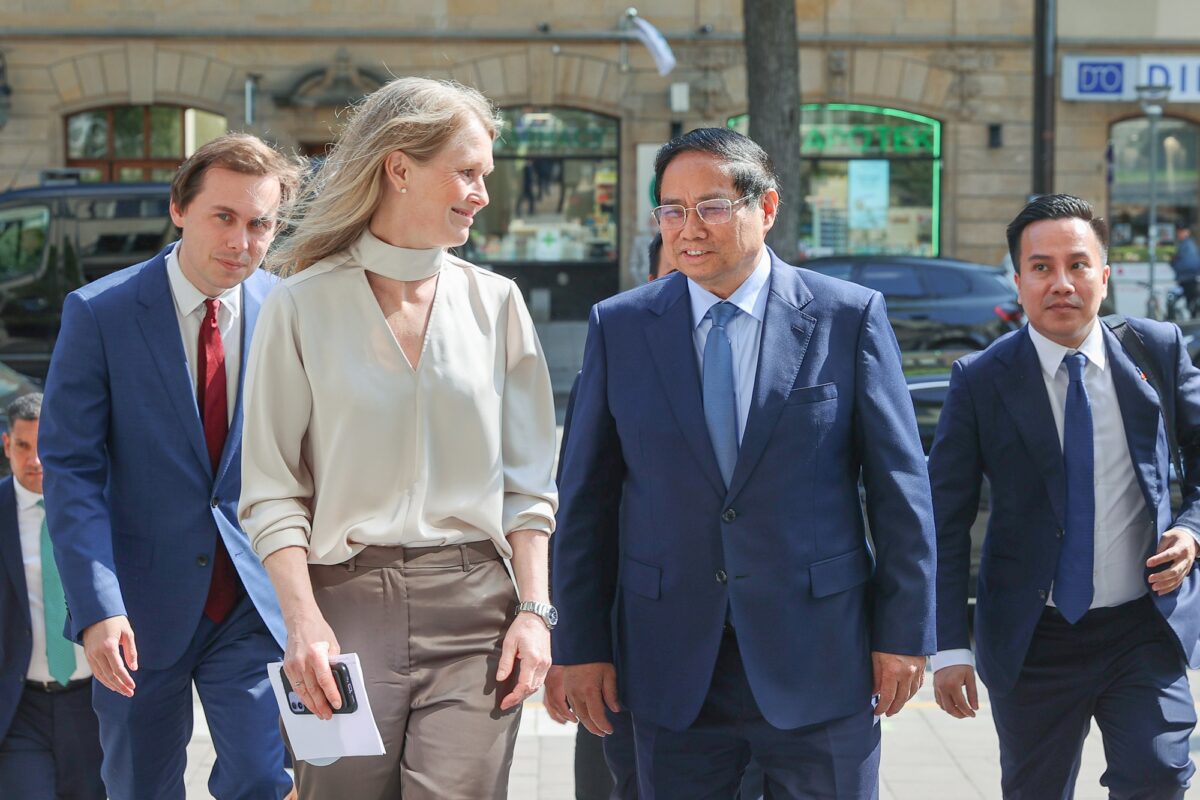On the morning of June 12 (local time; afternoon in Hanoi), during his official visit to Sweden, Prime Minister Pham Minh Chinh visited and delivered an important policy speech at the Stockholm School of Economics, focusing on the theme: Revitalizing and Elevating Vietnam–Sweden Relations as a Bridge for Peace, Cooperation, and Development in Southeast Asia and Northern Europe.
Accompanying the Prime Minister were Deputy Prime Minister and Minister of Foreign Affairs Bui Thanh Son, along with other members of the high-level Vietnamese delegation.
The Stockholm School of Economics, with its long-standing history, is one of the most prestigious universities in Europe in the field of business education.
The First Western Country to Establish Diplomatic Relations with Vietnam
Opening his address, Prime Minister Pham Minh Chinh expressed his deep impression with the university’s educational philosophy, encapsulated in the word FREE – an acronym for: Fact and science-based mindset; Reflective and self-aware; Empathetic and culturally literate; Entrepreneurial and responsible. This, the Prime Minister noted, reflects the generous, liberal, and open-minded spirit of the Swedish people and their country.
The Prime Minister recalled that 80 years ago, in the Declaration of Independence drafted and delivered by President Ho Chi Minh on September 2, 1945, the words “independence, freedom, and happiness” were the most important keywords, and they have since become the official motto of the Vietnamese State. President Ho Chi Minh also affirmed: “Nothing is more precious than independence and freedom.” To achieve independence, freedom, and happiness, the Vietnamese people paid a high price in blood and tears. In fact, no nation in the 20th century experienced as much pain and loss as Vietnam.
This visit to Sweden takes place at a moment of great significance for Vietnam, as the country marks major historical milestones: 80 years of National Day (September 2, 1945 – September 2, 2025) and 50 years of national reunification (April 30, 1975 – April 30, 2025).
The Government and people of Sweden have always been faithful and devoted friends of Vietnam. The Prime Minister recalled that in 1969, during the fiercest period of Vietnam’s struggle for national independence and reunification, Sweden was the first Western country to establish diplomatic relations with the Democratic Republic of Vietnam – now the Socialist Republic of Vietnam. This was a courageous decision.
It was in Stockholm, nearly six decades ago (1968), that the late Prime Minister Olof Palme carried a torch and led a march protesting the U.S. war in Vietnam. On April 30, 1975, also in Stockholm, Swedish people took to the streets to celebrate Vietnam’s historic victory and national reunification. On the recent occasion of the 50th anniversary of Vietnam’s reunification (April 30, 2025), Vietnam received the documentary film “Victory Vietnam,” gifted by Swedish friends.
In the memories of many Vietnamese people, Sweden is a living symbol of humanity and heartfelt support. Projects such as the Swedish Children’s Hospital, the Vietnam–Sweden Uong Bi Hospital, and the Bai Bang Paper Mill remain iconic landmarks, forever engraved in the hearts of the Vietnamese people.
The Prime Minister also shared that Vietnamese people deeply love the emotional, meaningful, and romantic music of Sweden, such as the song “Happy New Year” by ABBA – a melody that has become the traditional New Year’s greeting for generations of Vietnamese.
Visiting Sweden this time, the Vietnamese delegation hopes to open a new chapter in the traditional friendship and cooperation between the two countries: broader, deeper, and more connected in all areas, contributing positively to peace, stability, cooperation, and development in both regions and globally.
With that spirit, the Prime Minister shared three main points: (1) An overview of current global and regional situations; (2) Vietnam’s development direction; (3) A new vision for Vietnam–Sweden relations in the new era.
Vietnam and Sweden Must Share and Connect Resources
According to the Prime Minister, the world continues to witness complex, unpredictable, profound, and comprehensive changes, with many unprecedented and unforeseen issues. Overall, there is peace, but with local wars; overall détente, but with local tensions; overall stability, but with local conflicts.
He pointed out six major contradictions in today’s international relations: (i) Between war and peace; (ii) Between cooperation and competition; (iii) Between openness/integration and independence/self-reliance/protectionism; (iv) Between unity/integration and separation/fragmentation; (v) Between development and backwardness; (vi) Between autonomy and dependence.
In the new era of deep integration and connectivity – the era of smart technologies, digital transformation, and innovation – the future is being shaped by three primary forces and led by three pioneering domains:
The three main influencing forces are: (1) The explosive development of science, technology, and innovation, especially digitalization and artificial intelligence (AI); (2) The negative impact of both traditional and non-traditional security challenges (climate change, natural disasters, resource depletion, environmental and food security, water security, cybersecurity, aging population, transnational crime); (3) The growing trend of fragmentation and polarization in various areas, driven by global geo-strategic and geo-economic competition.
The three pioneering areas shaping the future are: (1) Development of the digital economy, green economy, and circular economy; (2) Innovation, entrepreneurship, and the Fourth Industrial Revolution; (3) Development of high-quality human resources and AI.
The Prime Minister emphasized that the world is facing issues of a people-wide, comprehensive, and global nature that no country can solve alone. Therefore, approaches to practical challenges must also be people-wide, comprehensive, and global. This requires all nations and regions to uphold international solidarity, multilateralism, international law, and the UN Charter.
In that context, Vietnam and Sweden must continue to cooperate closely, uphold peace, maintain independence and autonomy, promote substantive and extensive international cooperation based on goodwill, equality, and mutual respect, and adhere to the UN Charter and international law. The new context demands both nations enhance their self-reliance and resilience, share and connect resources, and respond to challenges more flexibly and effectively.
A Fundamental Shift in Development Thinking
Outlining Vietnam’s development orientation, the Prime Minister stated that Vietnam consistently focuses on building three foundational elements: a socialist democracy, a socialist rule-of-law state, and a socialist-oriented market economy.
Vietnam maintains a consistent stance: safeguarding political and social stability, public order, and safety; placing people at the center, as the subject, goal, driver, and most important resource of development; and not sacrificing social progress, equality, welfare, and the environment for mere economic growth.
Vietnam is focusing on six key policy priorities:
1. Economic development is the central task; building an independent, self-reliant, and resilient economy closely linked with proactive, extensive, substantive, and effective international integration.
2. Cultural development is the spiritual foundation of society and an internal strength – “culture lights the way for the nation” – “if culture survives, the nation survives; if culture perishes, the nation perishes.”
3. Social welfare must be ensured, with continuous improvement in the material and spiritual life of the people.
4. Building a clean and strong political system; intensifying the fight against corruption, negativity, and waste.
5. Pursuing an independent, self-reliant foreign policy; multilateralization and diversification; being a good friend, a reliable partner, and a responsible member of the international community; for peace and development in the region and the world.
6. Ensuring national defense, security, and foreign affairs as regular, essential tasks; building a strong people’s defense and security posture linked to the people’s trust; implementing the “four nos” defense policy.
Sharing with Swedish friends Vietnam’s achievements after nearly 40 years of renovation (Doi Moi), the Prime Minister emphasized key lessons:
• Nothing is more precious than independence and freedom;
• People make history, and the revolution is by the people, for the people;
• Unity is an invincible strength, requiring continuous consolidation (within the Party, among the people, among ethnic groups, and internationally);
• Combining national strength with the strength of the times, domestic strength with international strength;
• The correct leadership of the Communist Party is the foremost determinant of revolutionary success.
He also shared practical lessons from recent years:
• Valuing time, intelligence, and timely decisiveness; thinking long-term, acting boldly, and surpassing limits;
• Grasping realities and responding with proactive, flexible, and effective policies;
• Resources stem from mindset; motivation comes from innovation; strength comes from the people and businesses;
• High determination, great effort, and decisive action – turning the impossible into possible;
• The greater the pressure, the stronger the effort – viewing challenges as opportunities for innovation and restructuring.
Regarding future vision and orientation, he stated that the Vietnamese Party and State, led by General Secretary To Lam, have set a new vision: building a prosperous, civilized, and strong nation in the era of Vietnam’s rise. The country aims to achieve two strategic goals:
• By 2030, become a developing nation with modern industry and upper-middle income;
• By 2045, become a developed, high-income nation.
Vietnam is vigorously pursuing three strategic breakthroughs: institutional reform, infrastructure modernization, and smart governance. Efforts include streamlining administrative structures, restructuring local governance to a two-tier model, and advancing:
• Science and technology innovation, national digital transformation;
• Deeper international integration;
• Legal development and enforcement;
• Private sector development;
• Quality education reform – from knowledge-based to holistic education focusing on life skills and learner competencies;
• Healthcare reform – from treatment to preventive, continuous, community-based care.
The Prime Minister emphasized a paradigm shift in development thinking: from passive problem-solving to proactive service; from management to facilitation; from passive to active integration; from fragmented reform to comprehensive, synchronized breakthroughs; with enhanced decentralization, better resource allocation, stronger implementation capacity, and stricter oversight.
Five Breakthroughs in Vietnam–Sweden Relations
Looking to the future, Prime Minister Pham Minh Chinh proposed five breakthroughs to deepen Vietnam–Sweden ties:
1. Political and diplomatic breakthrough across all channels: Party, State, Parliament, and people-to-people. Promoting shared values (peace, independence, sincerity, multilateralism, international solidarity, respect for international law), political trust, and deep friendship.
2. Economic, trade, investment, and development cooperation: Matching the level and potential of both economies; connecting the two economies more closely.
3. Science, technology, innovation, digital and green transformation: Establishing this as a new engine for bilateral cooperation. The two countries must swiftly implement the Strategic Partnership on Science, Technology, and Innovation launched during this visit. As a tech powerhouse, Sweden is expected to continue supporting Vietnam’s transformation.
4. Jointly addressing global and regional challenges: Promoting the spirit of “cooperation and partnership.” Vietnam, like Sweden, is a maritime nation, with the sea holding strategic importance. Sweden is encouraged to support Vietnam in marine research, resource protection, and sustainable ocean economy development.
5. People-to-people, cultural, artistic, tourism exchanges, and local cooperation: Facilitating citizen mobility, education, and training; accepting more Vietnamese students and nurturing future Nobel laureates.
Building New Symbolic Landmarks in Bilateral Relations
The Prime Minister thanked the Government and people of Sweden for supporting the 22,000-strong Vietnamese community in Sweden to live, integrate, and contribute to local development.
“After nearly six decades of companionship, cooperation, and development, we have many stories to tell, much to discuss, and many programs to implement. We are committed to always being loyal friends of Sweden. Whatever you need, we will do our best. We are proud of our noble traditions, stand united in difficult times, and move forward together to build prosperous, happy nations,” he said.
He expressed hope for new symbolic projects in the bilateral relationship, especially in human resource training, with aspirations for Vietnamese students in Sweden to one day win Nobel Prizes.
The Prime Minister was pleased to learn about the Stockholm School of Economics’ cooperation with Vietnam, and the positive experiences of Vietnamese students at the university.
He invited the university to deepen ties with Vietnamese counterparts, share experiences, and support capacity building.
He also proposed that the Stockholm School of Economics establish a partnership with a Vietnamese university, such as the National Economics University, to foster shared core values between the two nations.

